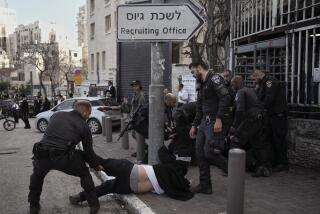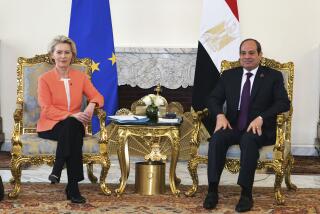Egypt announces new charges against Morsi, 35 others
CAIRO — Egypt’s interim government and the Muslim Brotherhood traded fresh blows Wednesday, with the prosecutor general announcing serious new charges against deposed Islamist President Mohamed Morsi and the Brotherhood declaring a boycott of next month’s vote on a new constitution.
The developments appeared to harden the months-long standoff between the army-backed administration and followers of Morsi, a confrontation that has left thousands of Brotherhood members dead or in jail and harmed the international standing of the government that supplanted his rule.
The new charges against Morsi, which could conceivably carry the death penalty, include assisting in terrorist acts and espionage, according to the prosecutor’s office. The ex-leader is also accused of collaborating with Hamas, the Palestinian militant group that rules the Gaza Strip. Hamas has denied any role in the battle between government troops and militant Islamists in Egypt’s Sinai Peninsula, which borders Gaza.
Morsi is already on trial on charges of inciting the killings of protesters a year ago, at the midpoint of his yearlong tenure in the presidency. The army removed him from power in July after massive protests demanding his ouster.
The new charges are being levied not only against Morsi but also 35 codefendants, including former senior advisors. They appear to stem from a prison break that occurred during the chaos of the 2011 uprising that drove longtime autocrat Hosni Mubarak from power.
The Brotherhood’s announcement of a referendum boycott, declared by its political arm, the Freedom and Justice Party, was not unexpected. However, it undercuts the government’s effort to use the poll as a means of bolstering its legitimacy. The vote on the proposed national charter is intended as a prelude to elections for the presidency and parliament, all elements of a “road map” back to democracy.
The government is not only urging a yes vote on the constitution but also hoping for a larger turnout than the balloting that gave a solid endorsement to the previous charter, which was written by the Morsi camp. That was thrown out when he was deposed.
The referendum campaign, which kicked off this week, has already run into problems. A banner displayed at a news conference meant to drum up support for the document was widely mocked after it was disclosed that stock photos of people of various nationalities were used to portray a cross-section of Egyptian society. In addition, the Arabic version of the campaign slogan misspelled the word “Egyptians.”
After that embarrassment, two members of the committee that wrote the new draft say a small but crucial change in wording was slipped in after the final version of the draft was approved. The constitution’s preamble now calls for a “civilian government” rather than the approved formulation “civilian rule.”
That has important implications, because in Egypt, the government is equated with the Cabinet. So the wording change is seen as opening the door to a leading role for military or religious figures, as long as they are not members of the Cabinet.
Meanwhile, authoritarian measures by the interim government continued to come under fire from both Islamists and secularists. An imprisoned activist who was prominent in the uprising that toppled Mubarak managed to smuggle a letter on tissue paper from his prison cell, and his April 6 movement posted it Wednesday on its Facebook page.
The activist, Ahmed Maher, who was arrested for defying a month-old law that in effect bans street protests, likened the current administration to the harsh police state under Mubarak.
“The revolution’s youth are suffering in prison cells and have been denied their basic rights,” he wrote.
Hassan is a special correspondent.
More to Read
Start your day right
Sign up for Essential California for news, features and recommendations from the L.A. Times and beyond in your inbox six days a week.
You may occasionally receive promotional content from the Los Angeles Times.






